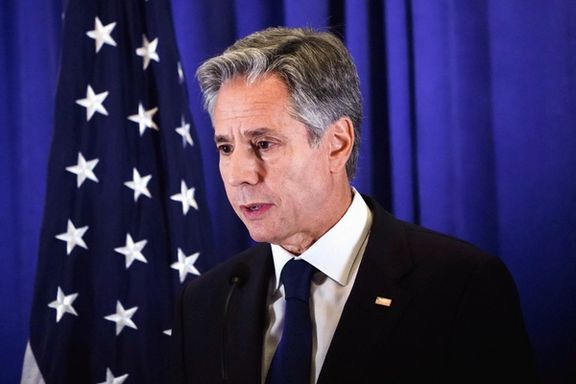Blinken Says Iran’s Nuclear Program ‘Profoundly Destabilizing’

US Secretary of State Antony Blinken has refrained from criticizing the Saudi Crown Prince for suggesting his country will get nuclear weapons if Iran does so first.

US Secretary of State Antony Blinken has refrained from criticizing the Saudi Crown Prince for suggesting his country will get nuclear weapons if Iran does so first.
Crown Prince Mohammed bin Salam speaking to Fox News this week referred to the danger of Iran producing nuclear weapons and said, "If they get one, we have to get one, for security reasons and the balance of power in the Middle East. But we don't want to see that.”
Asked during the press conference if this kind of Saudi desire is not destabilizing, Blinken replied, “I think the comments that you alluded to point to the fact that Iran’s own activities in pursuing a nuclear program are a profoundly destabilizing element and one that risks the security of countries not only in the region but well beyond it…” He went on to say, “And so the problem is very clear, and the problem is Iran. That is the destabilizing element.”
However, the Biden administration announced a prisoner exchange deal with Tehran in August that also released $6 billion of blocked funds from South Korea. Earlier, Blinken had also waived US sanctions to allow Iraq to release $2.7 billion. Indications point to ongoing secret talks with Qatar’s mediation to release more funds in return for a partial Iranian slowdown of its uranium enrichment. Critics argue that the release of billion of dollars simply empowers the Islamic Republic without imposing real limitations on its nuclear program or destabilizing activities in the region.
Blinken also said that Iran's decision to bar some UN nuclear inspectors suggests it is not interested in being a responsible actor on its atomic program.
The comments suggested Washington is skeptical of Tehran's desire to engage seriously on restricting its nuclear program.
The head of the International Atomic Energy (IAEA) nuclear watchdog has condemned Iran's move to bar multiple inspectors assigned to the country, hindering its oversight of Tehran's atomic activities.
Iran said it was responding to a call led by the United States and three European allies for Tehran to cooperate immediately with the UN nuclear watchdog on issues including explaining uranium traces found at undeclared sites.
One of the agency's key purposes is to prevent the spread of nuclear weapons by verifying that states honor their obligations to use nuclear technology only for peaceful purposes.
The IAEA was responsible for verifying Iran's compliance with the defunct 2015 Iran nuclear deal, JCPOA, under which Tehran curbed its nuclear program in return for the easing of US, European Union and UN sanctions.
Efforts to revive that deal, which then-US President Donald Trump abandoned in 2018, collapsed about a year ago and Washington has been searching for a new way to get Tehran to restrain its program.
"We tried to work indirectly with Iran as well as with European partners and even Russia and China to see if we can get a return to compliance with the Iran nuclear deal ... But Iran couldn't or wouldn't do that," Blinken told reporters.
"Just this past week we saw them remove IAEA inspectors who are critical to doing the work at the IAEA to - as best you can - ensure that Iran is consistent with whatever obligations it has," he said. "That is not evidence of an Iran that is interested in actually being a responsible actor."
Tehran's move, known as "de-designation" of inspectors, is allowed; states can generally veto inspectors assigned to visit their nuclear facilities under the nuclear Non-Proliferation Treaty and each country's safeguards agreement with the agency.
With reporting by Reuters